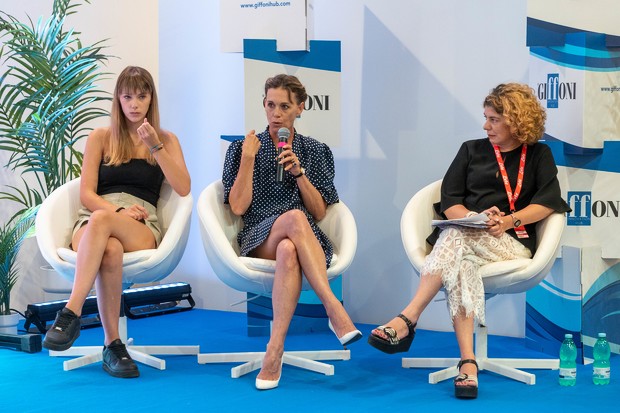Giffoni 2023
Industry Report: Gender Equality, Diversity and Inclusion
The Giffoni Innovation Hub hosts a debate on the fight against revenge porn and on safeguarding minors within film and creative contexts
The initiatives discussed included a memorandum signed by the Italian Department for Electronic Communications, Broadcasting and Postal Services and the MIA designed to transmit educational messages

On 25 July, the Giffoni Innovation Hub, unfolding within the Giffoni Film Festival (running 20-29 July), hosted a panel discussion entitled “Safeguarding minors on social media, from the use of emerging technology through to the reality of revenge porn in film and audiovisual contexts.”
Moderated by the director of Rome’s MIA Gaia Tridente, the discussion involved actresses Milena Mancini and Greta Gasbarri from the film Mia [+see also:
film review
trailer
film profile], as well as the head of the Italian Department for Electronic Communications, Broadcasting and Postal Services (DGSCERP), housed within the Ministry for Business and Made in Italy, Donatella Proto, and Rosanna Ranieri representing the Department for Family Policies within the Prime Minister’s Office.
After opening the debate, Tridente turned her focus to Ivano de Matteo’s movie, Mia, which explores the themes of revenge porn and psychological and power-related abuses, telling the story of a simple family who welcome a violent and manipulative young man into their lives, who subsequently turns the protagonist’s life upside down.
Mancini explained how difficult it was playing this role as a mother to two boys and having to picture herself as a parent of a teenage girl. “Nowadays, being a parent or someone who’s supposed to be a role model for young people is the hardest job in the world. It always has been, but these days kids have lived through Covid, they have far more issues. […] [When I was young] I was far more direct, far more physical. I was the type of teenager who’d get into fights with other girls over a boy. We’d look at one another, understand one another, be in tune with our animal instinct”, the actress explained.
She then stressed how “there’s a part of film, theatre and TV series, over and above entertainment and genre films” which has the duty to “portray modern-day humanity, so that viewers can see and understand themselves in a certain sense.” She also shared how, on various occasions, the film’s distributor 01 had organised separate screenings of the film: one for parents and one for children. At the end, the cast met with the parents and children together, encouraging a debate which would inevitably be continued outside of the cinema.
Tridente then asked Gasbarri how these themes are tackled in schools. According to the latter, there’s a real lack of awareness and information in schools: “We talk about them between us because we hear about [these themes], but in schools they’re not often talked about and they don’t explore them in depth. We do social studies but that doesn’t really cover it: we study articles of the Constitution, not social issues per se”.
Proto explained that her department recently signed a Memorandum with the MIA to better convey those educational messages which the institutions struggle to transmit and which the creative industries - film and TV included - can also pass on successfully.
“We mustn’t forget that technology is a tool, it can be neutral depending on how you use it. […] Helping people understand the risks and opportunities it presents was what motivated us and the Ministry for Business and Made in Italy to sign this Memorandum.”
“Revenge porn is just one of the many issues stemming from this hyper-connected world”, she added, before citing the threat of grooming, extreme isolation and cyberbullying, heightened by the after-effects of the pandemic.
Ranieri spoke about how her staff have been tackling cyberbullying since 2017, planning communications to combat this kind of abuse in co-operation with the Ministry of Education and Achievement, and Agcom. She then specified how all European government policies, including Italy’s, are based on the UN’s 1989 Convention on the Rights of the Child and Adolescent, and stressed the significant rise we’ve seen in the phenomenon of revenge porn, compared to other issues. What’s more, in collaboration with Telefono Azzurro, the Ministry’s scope of action has expanded to cover new kinds of juvenile issues and is no longer limited to extreme risks such as paedophilia and child pornography.
Ranieri then emphasised how the Department is trying to keep pace with the times by working across all social media channels, TikTok included. She also mentioned the latest campaign to raise awareness of the children’s emergency telephone number 114, which will be released exclusively on social media for the first time ever, without being broadcast on RAI as has happened in the past. The next awareness-raising campaign, meanwhile, will include a dedicated podcast for the very first time.
The debate closed with a brief Q&A session.
(Translated from Italian)
Did you enjoy reading this article? Please subscribe to our newsletter to receive more stories like this directly in your inbox.















